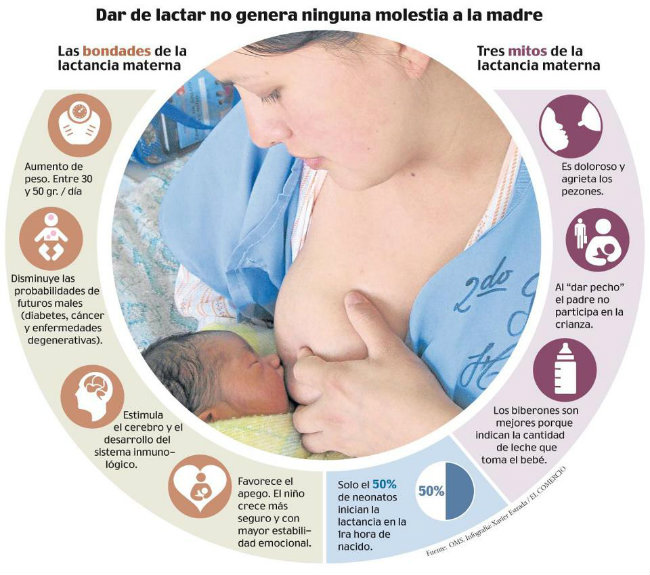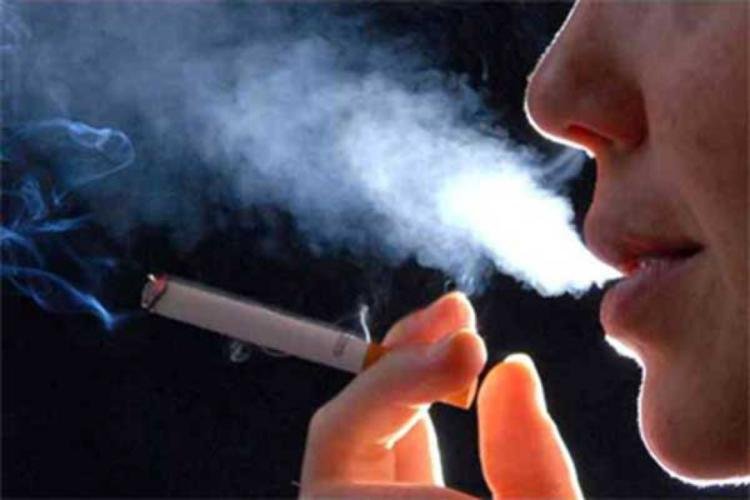Trabajadores 4
Breastfeeding: a support for life

Breastfeeding: a support for life
By Posted on 31 July, 2016 – 17:00 by Raiza Arango Medina
Translated and edited by Walter Lippmann for CubaNews

Benefits of breastfeeding. Taken from the internet
Breastfeeding is the first act of love given by a mother; moreover, it goes beyond the emotional connection established between her and her child.
It is scientifically proven that breast milk is the only food that children require for the first six months of life. “Any other type of drink, including water, would increase the risk of diarrhea or other illnesses. Exclusive breastfeeding is therefore the baby’s first immunization; there are no alternative formulas for its protection at the beginning of life,” said Dr. Roberto Álvarez Fumero, head of the Maternal and Infant Department of the Ministry of Public Health (MINSAP).
It is necessary to reiterate to Cuban women and their families the advantages of this universal and scientifically proven nutritional practice. Unfortunately, this ideal means of protection is not being used in an exceptional way up to six months of age by 70% of women, said Dr. Fumero.
In this sense, World Breastfeeding Week (August 1-7) is dedicated to promoting this practice as the optimal mode of nutrition in infancy. Its privileged use is based on the fact that human milk is composed of 88% water, a characteristic that facilitates the filtering function developed by the kidneys, so that the baby does not need to be rehydrated with any other liquid other than what the mother can offer.
A method of salvation
“Exclusive breastfeeding also means food security for children, because it can reduce hunger, malnutrition and obesity,” says the World Health Organization (WHO) in its campaign to promote this experience. In Cuba, actions are prioritized so that the whole society understands the goodness and countless benefits of this custom, which is an essential factor to achieve the Sustainable Development Goals in terms of health, explained the MINSAP specialist.
Earlier this year, the scientific journal The Lancet published a series of research studies, which show that increasing breastfeeding could save more than 820,000 children a year, nine out of 10 of them in the first months of life.
Fumero warned that infectious diseases are re-emerging in the world and there are others that -although our country has been able to control the hygienic-sanitary conditions that predispose them- continue to exist.
Its benefits for both parties are undeniable: it facilitates the development of the child’s intellect and protects it from possible chronic non-transmissible diseases; in women, it reduces the risk of hypertension, breast and ovarian cancer, postpartum depression, osteoporosis, and reduces weight gained during pregnancy.
The mother will help her health after childbirth with three balanced meals a day and two snacks; a nutritious formula sufficient to provide energy to the nursing mother.
According to studies, the amount of milk has nothing to do with the ingestion of beer or any other type of beverage perpetuated for generations as a stimulant to better flow the first food we receive in this world.
Similarly, Alvarez Fumero argued that investing in breastfeeding has a significant impact on the health of women and children and on the economies of families.
A guarantee from the start
Despite the persistence and vigilance on the part of MINSAP, Dr. Fumero stressed that Cuban mothers have to overcome a group of myths that unfortunately is passed on to several generations and more and more women are looking for a pretext not to breastfeed.
According to the Multiple Indicator Cluster Survey (MICS) conducted by the Ministry of Public Health between February and September 2014, only 33% of Cuban children received exclusive breastfeeding up to six months.
Regarding the issue, the scientist stressed that we cannot tolerate any excuse to stop breastfeeding when scientifically there is none that prevents it.
“This figure has a lot to do with cultural patterns in families that can be changed with the support of everyone, mainly family doctors, community organizations and the media,” Anna Lucia D’Emilio, representative of the United Nations Children’s Fund, once told the press.
For this reason, it is still a challenge to continue increasing actions to promote and encourage breastfeeding in Cuba, and this need is reflected in the MICS surveys, which indicate that 96.2 % of children born in the last two years have breastfed at some time. This percentage was 98% in 2011, according to these surveys.
According to the 2014 results, 48 % of infants breastfed within the first hour of birth, a figure that is also decreasing compared to the 77 % recorded in 2011.
Cuban medical institutions advise starting breastfeeding within the first hour after giving birth, breastfeeding exclusively during the first six months and continuing breastfeeding for two years or more.
The specialist concluded that guaranteeing optimal breastfeeding practices requires the support of the family and especially of the couple, who should share the mother’s sleepless nights and collaborate in every way. In addition, he added, it has been associated with long-term social behavior, which is more often adequate in those children who received exclusive breastfeeding.
By supporting and promoting breastfeeding, the nation complies with article 24 of the Convention on the Rights of the Child, which states that infants should enjoy the highest level of health.
In this sense, the specialist underlined the importance of having Human Milk Banks (BLH) in the country. These are currently located in eight provinces: Pinar del Rio, Havana, Matanzas, Las Tunas, Granma, Holguin, Santiago de Cuba and Guantanamo.
It is essential to emphasize that the BLHs are attended by mothers with their partners as it is part of the responsible motherhood that is intended to be transmitted in the country. At the end of 2015 in Cuba, 3 thousand 19 mothers became donors, and thanks to this, 738 liters of milk were collected, which benefited 1 thousand 285 newborns.
This August 4, bank number nine will be inaugurated at the Camilo Cienfuegos hospital in Sancti Spíritus, with the aim of helping in the survival of newborns, especially those born with congenital malformations and those who present malnutrition in the first stage of life.
About the author
Raiza Arango Medina
Graduated in Journalism at the Faculty of Communication of the University of Havana in 2014. Since then she has been dedicated to writing and research on social issues, aging and population dynamics. She is also one of the main editors of the Health page, specializing in topics related to health, science and technology. She has attended several postgraduate courses at the Center for Psychological and Sociological Research and at the International Institute of Journalism, related to the study of Cuban society.
She says: I’m a “Babe”
She Says, I’m a “Babe”
Posted on June 28, 2018 – 12:44 by Yoel Almaguer de Armas
Translated and edited by Walter Lippmann for CubaNews.
Don’t miss the translation note at the end. Thanks.

The World Health Organization predicts that smoking will cause 450 million deaths in the next 50 years. Photo: Taken from the newspaper Peridico 26
“Unlike my sister, who looks like a train puffing smoke, I have never swallowed it or talked about it while I have a cigarette in my mouth, and after smoking, I drink a glass of water so that the nicotine doesn’t hurt my airways.”
The gentleman who accompanied her told her that the cigar was not good in any of its forms and that the glass of water was an invention of hers. He told her that his grandfather was a country man, that he had a huge meadow in Pinar del Río and loved to chew tobacco.
“And she died of lung cancer?” she asked, half doubtful, suspicious.
“No, he got tired of living and died of something else.”
There was a time of silence between the two of us. I expected a reaction from her, because I knew she would comment on something, anything, to justify her vision as a smoker.
“Doctors always say that smoking causes lung cancer, but there are a lot of people with lung cancer who have never put one in their mouths.”
To corroborate the lady’s idea a little, the Cuban Journal of Hygiene and Epidemiology wrote in one of its issues that tobacco is associated with cancer of the mouth, pharynx, larynx, esophagus, stomach, pancreas, cervix, kidney, ureter, bladder, blood system and, especially, lung.
Studies published in issue 44 of this magazine show that women who smoke tend to have an earlier menopause and have a double risk of developing lung cancer than men, while men, when they smoke one pack a day, increase their risk of suffering from erectile dysfunction and premature ejaculation by 40%.
The lady, who was waiting for a test result in the lobby of the hospital in Havana, is one of the many people who wake up with a little coffee and a cigarette in their mouth, and when they don’t have them, they have a headache and the day is pure sorrow.
From the moment I heard it, I thought of an alternative that would help her reduce her addiction, until she quit smoking. She didn’t know I was a journalist because I didn’t tell her, either. You may read this paper and know that it is intended for her and everyone who has ever tried to quit smoking and has not been able to.
The World Health Organization, WHO, explains that tobacco kills more than 7 million people each year. Of these, more than 6 million are consumers of the product, and around 890,000 are non-smokers exposed to second-hand tobacco smoke.
WHO also states that in adults, smoke from other serious cardiovascular and respiratory disorders, particularly coronary heart disease and lung cancer, causes sudden death in infants and low birth weight in pregnant women.
The same Organization states that tobacco is the leading preventable cause of death in the world, and tobacco use is expected to cause 450 million deaths in the next 50 years.
The one who is a “titi” is one of the many people who recognize the negative effect that smoking cigarettes has on their health, and often have the obligation to quit when it causes them to say between life and the addiction to smoke.
========================
TRANSLATION NOTE: The Spanish headline is “Yo soy una “titi”. It’s a Cuban slang expression referring to a still-attractive, but no longer as young, female. Because it’s slang, I asked two Cuban translators. The first, a female in her seventies wrote:
A titi is slang for a very young person. In that context she means she looks and feels very young despite her 50’s.
The second, male in his fifties, wrote:
As to “titi”, very common too. It’s just slang (although not offensive) to refer to someone who looks really good, young and/or healthy (especially in cases of middle-aged people), and it can be used for men and women alike. Now, you would only call a woman “estas hecha un titi” when you’re close to her. Behind a woman’s back, it’s as common a sex-related remark as any other, like “Look at that temba (a woman in her 40s or 50s, remember that one? Like in discotemba?), she’s kind of old and yet see how tasty she looks”. But even if my grandmother complains about how weak or sick she feels because of her old age, I could very well use that expression and tell her, “Don’t say that, you look really great!” (…estas echa un titi). Hope you get the picture.
How to Regain Trust?
From Psychology: How to Regain Trust?
Posted on May 15, 2018 – 8:11 by Yoel Almaguer de Armas
 From the province of Camagüey, a father wrote to us saying that, after fifteen years of marriage with his wife, they decided to end their relationship. He says he got a job in Havana and that forced him to leave his only son behind. Several years have passed, and this father feels that he has lost the trust of his child He asks us how to recover it.
From the province of Camagüey, a father wrote to us saying that, after fifteen years of marriage with his wife, they decided to end their relationship. He says he got a job in Havana and that forced him to leave his only son behind. Several years have passed, and this father feels that he has lost the trust of his child He asks us how to recover it.
Answering his question, Rolando Javier Rodríguez Camejo, Specialist at the Counseling and Psychological Assistance Center of the Psychology Department of the University of Havana, explains that if the physical remoteness became psychological distance it is very likely that the child has filled the empty spaces with frustrations, resentments and other negative elements.
The psychologist advises not to try to recover trust through imposition, but using mechanisms that would facilitate the bond with the child. “The affective approach and closeness of the father with the son is important and this requires a systematic link”.
The specialist indicates that the mother’s support is important for this process. “Sometimes the mother’s family has a negative impact on the return of the father, and this situation causes the child to be in the middle of a conflict which generates emotional and psychological instability.”
Rodriguez Camejo concludes saying that in order to regain trust “the first thing that this dad should do is to achieve communication with his son, and later regain the authority which is earned over time.”
You can mail your questions to: yoel.almaguer@trabajadores.cu or through our website: http://www.trabajadores.cu/salud/
The Pride of Mike Jackson
 The Pride of Mike Jackson
The Pride of Mike Jackson
Posted on May 15, 2018 – 7:14 by Alina M. Lotti
A CubaNews translation.
Edited by Walter Lippmann.

During the Gala against Homophobia and Transphobia, the English activist Mike Jackson received the Cenesex Award. Photo: Heriberto González Brito
Stephen Beresford probably found in Mike Jackson a good story to include in what would later become the screenplay for the film Pride, a historical drama about the work of a group of LGBT activists (lesbian, gay, bisexual and transgender) who raised money to help families affected by the 1984 British miners’ strike.
A long time has passed since then and now Mike has had a chance to revisit those facts. Invited by the National Center for Sex Education (Cenesex) to celebrate the eleventh edition of the Conference against Homophobia and Transphobia, the activist, is also a member of the UNITE trade union. It’s the largest in the country, bringing together millions of members from various sectors, an organization in solidarity with Cuba, shared here with the public some of his experiences with the film and the event that motivated it.
“It was during Margaret Thatcher’s second term in office (1983-1987) when she intended to close a large number of mines and put thousands of workers out of work. I was just a young man of socialist thought and a member of the LGBT community, for whom it was important not only to recognize their rights, but also those of others.
“Stephen, the screenwriter, thought the story was incredible and worth taking to the big screen. The experience was different for those of us who were part of that group. I came from the working class and it was easy for me to identify with that cause.
That is to say, during all these years millions of human beings have had the possibility of learning the real dimension of the facts…
In September 2014 it premiered in the UK and it was amazing! Many young people were attracted to it. Today, new groups have emerged in the gay community, such as those who support dockworkers and immigrants. Many are trying to do what we did at that time. We couldn’t hope for anything better!
Thanks to the film we were able to broaden our voices in the UK and in other nations, and to speak not only of struggle and commitment, but also of solidarity.
This is the first time he has visited Cuba and it has only been three weeks. However, how do you see respect for the LGBTI community (this last letter has been incorporated a few years ago and means intersex)?
I feel very safe here; there are no drug users or homeless people on the streets. Compared to London there is a great contrast. My country has lived for 40 years with strong right-wing rule, but now the new leader of the Labour Party, Jeremy Corbyn, is a great candidate on the left.
As for what you ask me, I believe that Cuba has made progress on the rights of the LGBT community, similar to my country.
If there was the possibility of a second film….
If that happens I’ll migrate to the moon!
The 11th Cuban Conference against Homophobia and Transphobia: For schools without homophobia and transphobia, began on May 4 and will run until May 18 in the context of the 30th anniversary of Cenesex, the main organizer and promoter of the event. Under the motto I include myself, this year – and for the second time – the campaign focuses on better education for the new generations.
Subscribe to Blog via Email
| M | T | W | T | F | S | S |
|---|---|---|---|---|---|---|
| 1 | 2 | 3 | 4 | 5 | 6 | |
| 7 | 8 | 9 | 10 | 11 | 12 | 13 |
| 14 | 15 | 16 | 17 | 18 | 19 | 20 |
| 21 | 22 | 23 | 24 | 25 | 26 | 27 |
| 28 | 29 | 30 | 31 | |||

You must be logged in to post a comment.